Strictly Personal
Nigeria and its unserious, unproductive, holiday-craving population, By Ikechukwu Amaechi
Published
10 months agoon

The idea of this week’s column is not original. Neither is the title. Both came from two senior citizens who are not only fans but also religiously comment.
Expectedly, our story on Monday, “Eid-el-Kabir: FG declares Wednesday, Thursday public holidays”, caught their attention. One of them, an elder stateswoman and retired Federal Permanent Secretary, exclaimed: “Very convenient! So they can take off from Tuesday to Friday. Unserious, unproductive country.”
I was still pondering over that when the elder statesman, a retired boardroom guru, sent a cryptic riposte: “Useless country.”
Then, he followed it up with another text: “12 Christians, 12 Muslims, State fight to get 12. 36 no work days. Plus 52×2 – 104 Saturdays and Sundays – almost 140 days of no work in a wretched country that is the poverty capital of the world. Idiotic!”
That may be an exaggeration but it is close to reality because when it comes to no work days, Nigeria only competes with such countries as Myanmar, Nepal, Iran, Sri Lanka, Bangladesh and Cambodia. That is not a good company to keep for a country with 63 per cent of its population (133 million people) multi-dimensionally poor and 41 per cent unemployed. The tragi-comedy has been made worse by the supremacy battle of the two dominant religions – Christianity and Islam – none of which is indigenous.
But as bad as this picture is, it is not even the full story. In most Muslim-dominated states, Fridays have equally been appropriated as part of the weekend work-free days. Where it is not expressly so, workers at best work half-day, leaving for home after the Jumu’ah Prayer (Friday prayer).
And true to prediction, Governor Umar Namadi of Jigawa State, on Tuesday, extended the Eid-el-Kabir holiday to Friday. A statement by his head of service, Alhaji Hussaini Ali Kila, said: “The Jigawa State Government has declared Friday, June 30, 2023 work free day in commemoration of this year’s Eid-el-Kabir celebration.”
In neighbouring Katsina, one of the most educationally backward states in Nigeria, Governor Dikko Umar Radda declared a one-week holiday for primary and secondary school students for the Sallah celebration. In Kano, the Education Ministry announced a Sallah break for all day and boarding public/private primary and post primary schools in the state, commencing Friday, June 23.
Truth be told, even in those states where no public announcements were made, particularly in the North, the working week ended Tuesday. It will even be a struggle to drag some back to work on Monday.
When these ceremonies fall on weekends, the nearest weekday is quickly appropriated as a public holiday. Since it has become a convention that a minimum of two days must be used in celebration, if the ceremonies fall on a Saturday and Sunday, then Monday and Tuesday are sacrificed on the country’s hedonistic altar.
For instance, many of the public holidays that fell on weekends in 2022 were celebrated on weekdays. New Year Day, January 1, was a Saturday but January 3, was declared New Year Day holiday; May 1, a Sunday was Labour Day but May 2 – Monday – was Labour Day holiday; June 12 – Sunday – was Democracy Day but June 13 – Monday – became Democracy Day Holiday; Sunday, July 10 and Monday, July 11 were days for the 2022 Eid-el-Kabir but the holiday was extended to Tuesday, July 12; the holiday for October 1, which fell on a Saturday was celebrated on Monday, October 3; October 8, 2022 was the date for Id el Maulud but because that was a Saturday, Monday, October 10 was declared a holiday; and Christmas Day in 2022 fell on a Sunday and Boxing Day, December 26 was Monday, Tuesday, December 27 became Christmas Day holiday.
This is ridiculous particularly against the backdrop that on public holidays major economic activities are automatically shut down – all financial institutions, schools, and government offices all go on break.
The bigger tragedy is that even as many think that we already have too many work-free days in a country where, ideally, every hour of the 365 days in a year ought to be maximally utilized in productive ventures, some are still clamouring for more.
The ultra-conservative Muslim Ummah are still agitating that the beginning of the Islamic year be declared a public holiday insisting that the Gregorian calendar is a Christian creation. Thus, July 19, 2023, which is the Gregorian date for 1445 AH, the beginning of the 2023 Islamic year should be declared a public holiday. To be sure, some states had already started observing it as a work-free day. Sooner than later, it will become a national holiday.
It is even worse every election year. In an era when you can hardly know that elections are being held in some countries, including here in Africa, Nigeria is entirely shut down on election days. Many state governors declared work free days to enable residents register for the 2023 elections and to collect their Permanent Voter Cards, PVCs, in an election Professor Mahmoud Yakubu-led Independent National Election Commission, INEC, disingenuously rigged beforehand.
Then, throw into the mix the fact that non-state actors like the Mazi Nnamdi Kanu-led Indigenous People of Biafra, IPOB, in the last two years declared every Monday a work-free day in the South-East, then the gravity of the problem stares you in the face.
Until Nnamdi Kanu is released from prison, IPOB declared every Monday a sit-at-home day starting from August 9, 2021. A statement by the group’s Media and Publicity Secretary, Emma Powerful, announcing the harebrained policy of the self-determination group said: “We the global family of the Indigenous People of Biafra, IPOB, wish to announce to all Biafra citizens, friends of Biafra and lovers of Biafra freedom and independence that IPOB leadership has declared every Monday ‘a ghost Monday’.
“This declaration takes effect from Monday, August 9, 2021. From that day Biafra land will be on lockdown every Monday from 6:00am to 6:00pm until our leader, Mazi Nnamdi Kanu, who was unlawfully abducted in Kenya and illegally detained by the Federal Government of Nigeria is released.
“Nobody should attempt to flout this directive as doing so may come with huge consequences. Anybody flouting this order is taking a grave risk.”
And, indeed, it came with fiendish consequences for innocent people whose only crime was daring to eke out a living for their families on Mondays. It is so bad that even when IPOB disavowed the “ghost Monday” farce, it has become a permanent feature in the South-East calendar because many are yet to recover from their tragic experiences and even South-East governments are observing it. As if that is not bad enough, IPOB has also extended the “ghost days” to any day Nnamdi Kanu was billed to appear in court, his birthday.
So, why these many work-free days? None of the two religions – Christianity and Islam – pushing that every of the 365 days be declared a public holiday is indigenous. They are foreign religions and not even in the Arabian Peninsula and Israel where they originated are so many man hours wasted as work-free days in the name of religion.
In the developed climes of Europe and North America, no one can afford such luxury. For instance, in the United Kingdom, there are only eight bank holidays (public holidays), that the public receive as days off work, per calendar year: New Year’s Day, Good Friday, Easter Sunday, May Day, late May Bank Holiday, Summer Bank Holiday, Christmas Day and Boxing Day. The United States recognises 12 federal holidays and in Canada, there are 10 paid general holidays every year.
These incessant work-free days are ill-advised. They are needless and counter-productive and must be reduced if Nigerian leaders are serious about jumpstarting the economy and revving the engine of production and development. Holidays that fall on weekends should be celebrated on such days. No country desirous of productivity can afford to deliberately put her people out of work in the name of religious ceremonies as Nigeria does. The idea of unending public holidays is not only absurd but also sickening.
You may like
-


FX bank swaps account for 30% of Nigeria’s external reserves— Fitch
-


Nigeria: Civil society group sues 36 govs, Wike over N5.9tn, $4.6bn loans
-


Nigeria offers oil majors faster exit if …
-


Nigeria’s Security Exchange chief to meet foreign, local crypto exchanges, others over crypto regulation
-
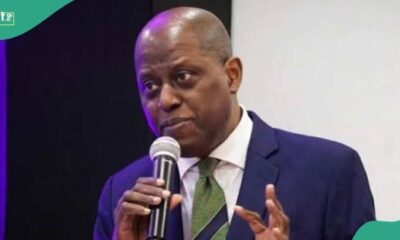

Nigeria’s central bank blames food inflation on govt’s purchase of palliatives
-
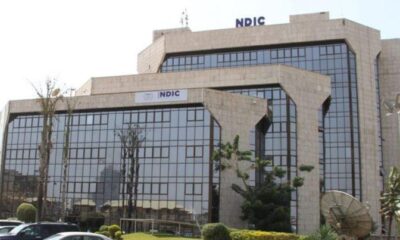

Nigeria’s Insurance Corporation raises maximum deposit coverage from N500k to N5m
Strictly Personal
This Sudan war is too senseless; time we ended it, By Tee Ngugi
Published
7 days agoon
April 28, 2024
Why are the Sudanese Armed Forces (SAF) and the paramilitary Rapid Support Forces (RPF) engaged in a vicious struggle? It is not that they have ideological, religious or cultural differences.
Not that people should fight because of these kinds of differences, but we live in a world where social constructions often lead to war and genocide. It is not that either side is fighting to protect democracy. Both sides were instruments of the rapacious dictatorship of Omar el-Bashir, who was overthrown in 2019.
Both are linked to the massacres in Darfur during Bashir’s rule that led to his indictment by the International Criminal Court for crimes against humanity. They both stood by as ordinary, unarmed people took to the streets and forced the removal of the Bashir regime.
None of these entities now fighting to the last Sudanese citizen has any moral authority or constitutional legitimacy to claim power. They both should have been disbanded or fundamentally reformed after the ouster of Bashir.
The SAF and the RSF are fighting to take over power and resources and continue the repression and plunder of the regime they had supported for so long. And, as you can see from news broadcasts, they are both well-versed in violence and plunder.
Since the fighting began in 2023, both sides have been accused of massacres that have left more than 30,000 people dead. Their fighting has displaced close to 10 million people. Their scramble for power has created Sudan’s worst hunger crisis in decades. Millions of refugees have fled into Chad, Ethiopia and South Sudan.
The three countries are dubious places of refuge. Chad is a poor country because of misrule. It also experiences jihadist violence. Ethiopia is still simmering with tensions after a deadly inter-ethnic war.
And South Sudan has never recovered from a deadly ethnic competition for power and resources. African refugees fleeing to countries from which refugees recently fled or continue to flee sums up Africa’s unending crisis of governance.
Africa will continue to suffer these kinds of power struggles, state failure and breakdown of constitutional order until we take strengthening and depersonalising our institutions as a life and death issue. These institutions anchor constitutional order and democratic process.
Strong independent institutions would ensure the continuity of the constitutional order after the president leaves office. As it is, presidents systematically weaken institutions by putting sycophants and incompetent morons in charge. Thus when he leaves office by way of death, ouster or retirement, there is institutional collapse leading to chaos, power struggles and violence. The African Union pretends crises such as the one in Sudan are unfortunate abnormally. However, they are systemic and predictable. Corrupt dictatorships end in chaos and violence.
Tee Ngugi is a Nairobi-based political commentator.
Strictly Personal
Air Peace, capitalism and national interest, By Dakuku Peterside
Published
3 weeks agoon
April 16, 2024
Nigerian corporate influence and that of the West continue to collide. The rationale is straightforward: whereas corporate activity in Europe and America is part of their larger local and foreign policy engagement, privately owned enterprises in Nigeria or commercial interests are not part of Nigeria’s foreign policy ecosystem, neither is there a strong culture of government support for privately owned enterprises’ expansion locally and internationally.
The relationship between Nigerian businesses and foreign policy is important to the national interest. When backing domestic Nigerian companies to compete on a worldwide scale, the government should see it as a lever to drive foreign policy, and national strategic interest, promote trade, enhance national security considerations, and minimize distortion in the domestic market as the foreign airlines were doing, boost GDP, create employment opportunities, and optimize corporate returns for the firms.
Admitted nations do not always interfere directly in their companies’ business and commercial dealings, and there are always exceptions. I can cite two areas of exception: military sales by companies because of their strategic implications and are, therefore, part of foreign and diplomatic policy and processes. The second is where the products or routes of a company have implications for foreign policy. Air Peace falls into the second category in the Lagos – London route.
Two events demonstrate an emerging trend that, if not checked, will disincentivize Nigerian firms from competing in the global marketplace. There are other notable examples, but I am using these two examples because they are very recent and ongoing, and they are typological representations of the need for Nigerian government backing and support for local companies that are playing in a very competitive international market dominated by big foreign companies whose governments are using all forms of foreign policies and diplomacy to support and sustain.
The first is Air Peace. It is the only Nigerian-owned aviation company playing globally and checkmating the dominance of foreign airlines. The most recent advance is the commencement of flights on the Lagos – London route. In Nigeria, foreign airlines are well-established and accustomed to a lack of rivalry, yet a free-market economy depends on the existence of competition. Nigeria has significantly larger airline profits per passenger than other comparable African nations. Insufficient competition has resulted in high ticket costs and poor service quality. It is precisely this jinx that Air Peace is attempting to break.
On March 30, 2024, Air Peace reciprocated the lopsided Bilateral Air Service Agreement, BASA, between Nigeria and the United Kingdom when the local airline began direct flight operations from Lagos to Gatwick Airport in London. This elicited several reactions from foreign airlines backed by their various sovereigns because of their strategic interest. A critical response is the commencement of a price war. Before the Air Peace entry, the price of international flight tickets on the Lagos-London route had soared to as much as N3.5 million for the economy ticket. However, after Air Peace introduced a return economy class ticket priced at N1.2 million, foreign carriers like British Airways, Virgin Atlantic, and Qatar Airways reduced their fares significantly to remain competitive.
In a price war, there is little the government can do. In an open-market competitive situation such as this, our government must not act in a manner that suggests it is antagonistic to foreign players and competitors. There must be an appearance of a level playing field. However, government owes Air Peace protection against foreign competitors backed by their home governments. This is in the overall interest of the Nigerian consumer of goods and services. Competition history in the airspace works where the Consumer Protection Authority in the host country is active. This is almost absent in Nigeria and it is a reason why foreign airlines have been arbitrary in pricing their tickets. Nigerian consumers are often at the mercy of these foreign firms who lack any vista of patriotism and are more inclined to protect the national interest of their governments and countries.
It would not be too much to expect Nigerian companies playing globally to benefit from the protection of the Nigerian government to limit influence peddling by foreign-owned companies. The success of Air Peace should enable a more competitive and sustainable market, allowing domestic players to grow their network and propel Nigeria to the forefront of international aviation.
The second is Proforce, a Nigerian-owned military hardware manufacturing firm active in Rwanda, Chad, Mali, Ghana, Niger, Burkina Faso, and South Sudan. Despite the growing capacity of Proforce in military hardware manufacturing, Nigeria entered two lopsided arrangements with two UAE firms to supply military equipment worth billions of dollars , respectively. Both deals are backed by the UAE government but executed by UAE firms.
These deals on a more extensive web are not unconnected with UAE’s national strategic interest. In pursuit of its strategic national interest, India is pushing Indian firms to supply military equipment to Nigeria. The Nigerian defence equipment market has seen weaker indigenous competitors driven out due to the combination of local manufacturers’ lack of competitive capacity and government patronage of Asian, European, and US firms in the defence equipment manufacturing sector. This is a misnomer and needs to be corrected.
Not only should our government be the primary customer of this firm if its products meet international standards, but it should also support and protect it from the harsh competitive realities of a challenging but strategic market directly linked to our national military procurement ecosystem. The ability to produce military hardware locally is significant to our defence strategy.
This firm and similar companies playing in this strategic defence area must be considered strategic and have a considerable place in Nigeria’s foreign policy calculations. Protecting Nigeria’s interests is the primary reason for our engagement in global diplomacy. The government must deliberately balance national interest with capacity and competence in military hardware purchases. It will not be too much to ask these foreign firms to partner with local companies so we can embed the technology transfer advantages.
Our government must create an environment that enables our local companies to compete globally and ply their trades in various countries. It should be part of the government’s overall economic, strategic growth agenda to identify areas or sectors in which Nigerian companies have a competitive advantage, especially in the sub-region and across Africa and support the companies in these sectors to advance and grow to dominate in the African region with a view to competing globally. Government support in the form of incentives such as competitive grants ,tax credit for consumers ,low-interest capital, patronage, G2G business, operational support, and diplomatic lobbying, amongst others, will alter the competitive landscape. Governments and key government agencies in the west retain the services of lobbying firms in pursuit of its strategic interest.
Nigerian firms’ competitiveness on a global scale can only be enhanced by the support of the Nigerian government. Foreign policy interests should be a key driver of Nigerian trade agreements. How does the Nigerian government support private companies to grow and compete globally? Is it intentionally mapping out growth areas and creating opportunities for Nigerian firms to maximize their potential? Is the government at the domestic level removing bottlenecks and impediments to private company growth, allowing a level playing field for these companies to compete with international companies?
Why is the government patronising foreign firms against local firms if their products are of similar value? Why are Nigerian consumers left to the hands of international companies in some sectors without the government actively supporting the growth of local firms to compete in those sectors? These questions merit honest answers. Nigerian national interest must be the driving factor for our foreign policies, which must cover the private sector, just as is the case with most developed countries. The new global capitalism is not a product of accident or chance; the government has choreographed and shaped it by using foreign policies to support and protect local firms competing globally. Nigeria must learn to do the same to build a strong economy with more jobs.
EDITOR’S PICK


Nigerian retail startup Renda secures $1.9m funding to drive expansion
Nigeria’s retail startup, Renda, has announced securing a $1.9 million pre-seed round of equity and debt funding to enable it...


Burna Boy emerges Africa’s top earning artiste in the US from tours, concerts
Nigerian Afrobeats sensation, Burna Boy, has emerged as the first African artiste to stage the highest-grossing arena concerts and tours...


Nigeria’s 4x400m mixed relay, 4×400 teams qualify for Olympics
Team Nigeria on Sunday morning booked two places at the upcoming Paris Olympics Games in the Mixed 4x400m relay and...


FX bank swaps account for 30% of Nigeria’s external reserves— Fitch
Global credit ratings firm, Fitch, has claimed that approximately 30% of Nigeria’s external reserves is comprised of foreign exchange (FX)...


Nigeria: Civil society group sues 36 govs, Wike over N5.9tn, $4.6bn loans
A civil society organisation in Nigeria, Socio-Economic Rights and Accountability Project (SERAP), has dragged the 36 state governors of the...
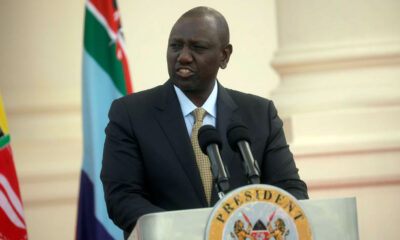

Kenya: President Ruto hints at ‘dire’ weather outlook as Cyclone Hidaya nears
President William Ruto has announced that the severe rains that have been plaguing Kenya for the past several weeks resulting...
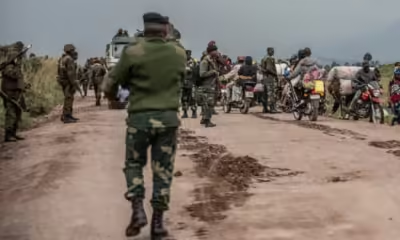

Again, Rwanda denies it attacked displaced persons in DR Congo
For the sixteenth time, Rwanda refuted US charges on Saturday that its troops attacked a camp for internally displaced persons...


Nigeria offers oil majors faster exit if …
Oil-rich West African country, Nigeria, has offered major oil companies, such as Exxon Mobil and Shell, that planned to leave...


Nigeria’s Security Exchange chief to meet foreign, local crypto exchanges, others over crypto regulation
On Monday, local and international cryptocurrency exchanges will meet with Dr. Emomotimi Agama, the recently appointed Director General of the...


Rhino Resources, BP-Eni JV sign agreement for Namibia offshore licence
Rhino Resources Namibia and a BP-Eni joint venture have agreed to share a 42.5% stake in a block located in...
Trending
-

 VenturesNow21 hours ago
VenturesNow21 hours agoNigeria offers oil majors faster exit if …
-

 Sports1 day ago
Sports1 day agoKenyan footballer arrested over brutal robbery, murder case
-
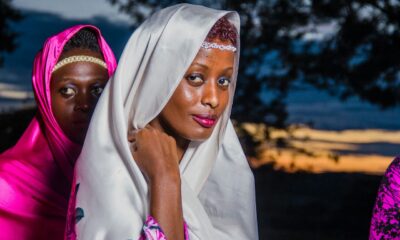
 Culture1 day ago
Culture1 day agoMeet the Ugandan tribe where bride’s aunt must ‘test’ groom’s manhood before marriage
-

 Culture2 days ago
Culture2 days agoEgypt unveils stamp to mark 100th anniversary of relationship with Brazil


